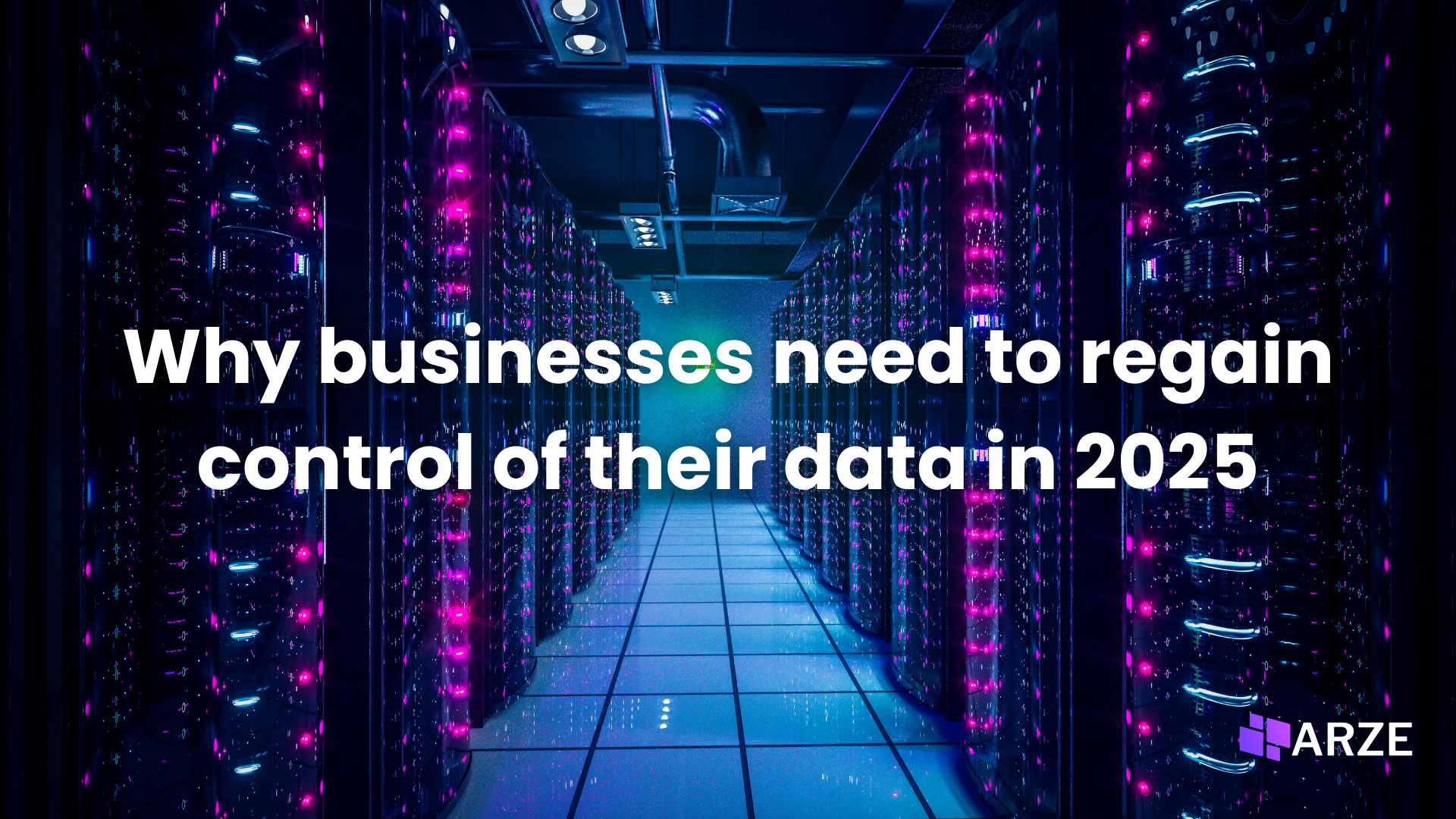Never in economic history has data been as valuable as it is today. Every digital interaction — a click, a search, a transaction, a movement — produces exploitable traces. This information, when aggregated and analyzed, enables companies to better understand their customers, optimise their operations, reduce costs and innovate more quickly.
But as this resource becomes strategic, it brings with it new challenges. Cyberattacks are on the rise, regulators are increasing compliance requirements, and dependence on external infrastructure is undermining the sovereignty of organisations.
By 2025, regaining control of one’s data will no longer be a choice: it will be a vital necessity. Digital sovereignty is not just a matter of legal compliance; it is also a condition for survival, competitiveness, and trust in an increasingly digitalized world.
Data is a digital asset, but also a strategic Achilles heel
For more than ten years, experts have been referring to data as the ‘new black gold’. This comparison clearly illustrates its economic potential: the more data is extracted, the more value can be created. Unlike oil, however, data is an inexhaustible resource that is growing exponentially and can be used simultaneously by multiple players.
However, this abundance poses a major problem: dispersion and vulnerability. Modern companies store their data in multiple environments:
- SaaS applications (CRM, HR, accounting, project management, etc.),
- Public clouds managed by large hyperscalers,
- Internal servers that are often ageing,
- Partner or subsidiary databases that are sometimes poorly protected.
This fragmentation leads to three types of risks:
- Loss of control: companies often do not know where their data actually resides, who accesses it, and for what purposes.
- Cyberattacks: hackers exploit fragmentation to multiply entry points.
- Hidden costs: dispersion complicates governance, generates duplication, and hinders the ability to leverage AI.
The figures are alarming: 86% of companies have already suffered a data breach in recent years, and nearly three-quarters have been victims of accidental leaks. In some cases, fines imposed by regulators exceed annual innovation budgets, drastically reducing organisations’ competitiveness.
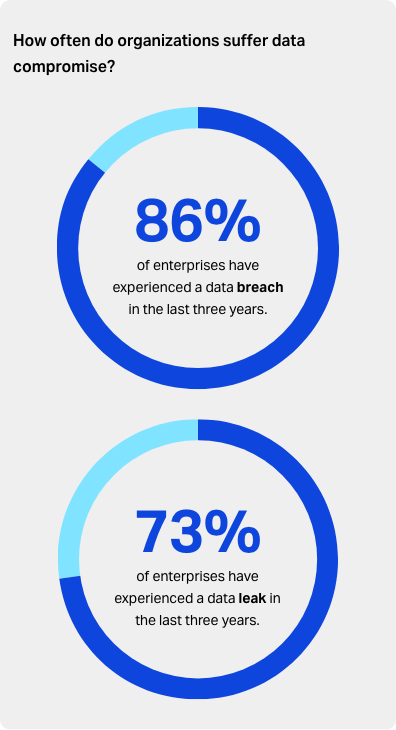
Regulations: a global mosaic to master
As data flows from one country to another, the issue of sovereignty also becomes geopolitical. By 2025, more than 140 countries already have data localisation laws in place. This means that certain information must be stored and processed within a given territory, or else face heavy penalties.
In Europe, the GDPR (General Data Protection Regulation) paved the way in 2018, imposing new rules on transparency and consent. Since then, the European Union has strengthened its arsenal:
- The Data Governance Act aims to regulate data sharing between actors.
- The AI Act introduces specific obligations for artificial intelligence systems, particularly those using sensitive data.
In the United States, the situation is more fragmented: the Cloud Act allows authorities to access data hosted by US providers, even if it is located outside the country, while California has introduced the CCPA, inspired by the GDPR.
In Asia, the trend is even stricter: China with the PIPL and India with the DPDP impose rigid rules on local storage and processing.
This regulatory mosaic complicates life for international companies, which must now manage complete traceability of data flows in order to remain compliant. Organisations that fail to master their governance expose themselves to financial penalties, but also to a loss of credibility with their partners and customers.
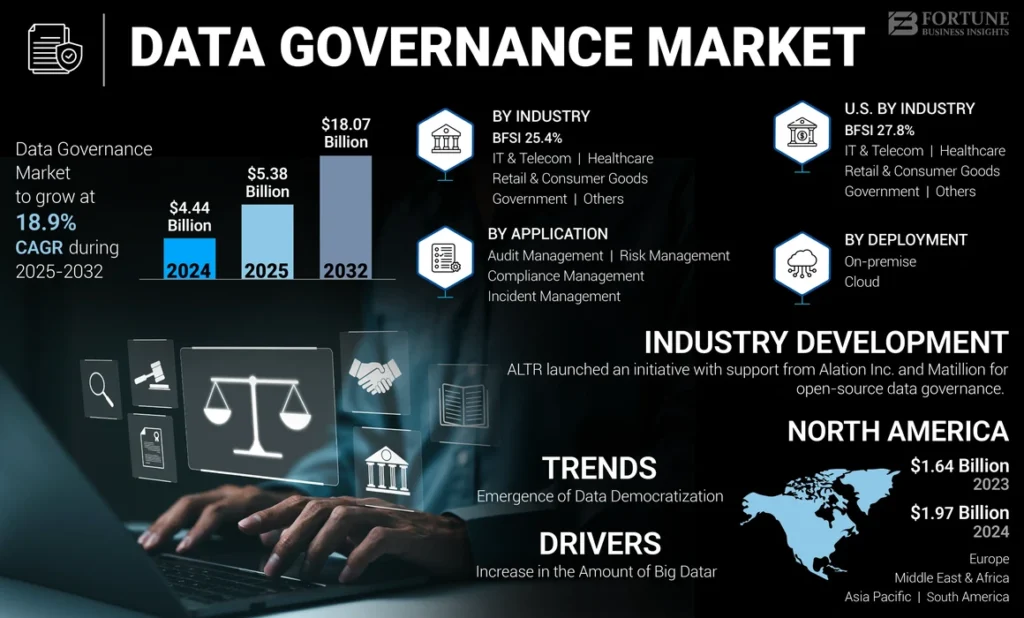
Cybersecurity: from protection to resilience
Cyberattacks are becoming increasingly professional. Ransomware has become a veritable industry, operated by organised groups, sometimes backed by governments. In 2024, the number of attacks rose by 60%, affecting small businesses and large multinationals alike.
But a cyberattack is not just a temporary disruption. Stolen data can be resold on the dark web, exploited for industrial espionage or used to manipulate markets.
Faced with this threat, companies understand that it is no longer enough to protect themselves: they must become resilient. This means:
- knowing where sensitive data is located at all times,
- limiting dependence on external service providers,
- integrating geopolitical risks into technological choices.
A recent survey shows that 67% of large companies now consider control of their infrastructure to be essential when choosing a cloud or IT provider. Better still, 87% explicitly integrate geopolitical factors (international tensions, dependence on foreign jurisdictions) into their digital investment decisions.
To address these challenges, adopting sovereign cloud solutions is becoming crucial. At ARZE, we use OVHcloud, a major player in the European sovereign cloud, to host components that require a secure infrastructure.
We reinforce this security with Hedera Hashgraph DLT, a distributed ledger technology that guarantees data traceability, integrity, and immutability. Each transaction is time-stamped and verifiable, greatly limiting the risk of fraud or manipulation. Combined with our approach, where companies retain ownership of their databases, this ensures end-to-end protection without ever centralising or duplicating sensitive information.
In short, cybersecurity is no longer just technical: it is strategic, regulatory and political, and requires solutions that can reconcile security, sovereignty and flexibility.
Sovereign cloud and hybrid infrastructures: towards a new architecture
The dominance of hyperscalers (Amazon AWS, Microsoft Azure, Google Cloud) has enabled widespread adoption of the public cloud, but it is increasingly coming under criticism. By entrusting their data to these giants, companies are accepting a form of technological and legal dependence, which can become a major risk in the event of international tensions.
The current trend is moving towards sovereign cloud and hybrid cloud:
- Sovereign cloud ensures that data is stored and processed in a specific territory under local jurisdiction.
- Hybrid cloud combines the best of both worlds: public cloud for flexibility and scalability, private cloud for security and control.
- Cloud repatriation involves repatriating certain critical workloads from the public cloud, either internally or to specialised infrastructure.
According to several studies, 83% of companies are considering partial repatriation of their critical data, and more than half are already using a multi-cloud architecture to diversify their risks.
These new architectures offer better data control while maintaining operational flexibility. They reflect a growing awareness that digital sovereignty cannot be delegated; it must be built.
At ARZE, we integrate this logic with OVHcloud for the European sovereign cloud and Hedera Hashgraph DLT to secure all transactions and data flows. Our back office and Business Intelligence tools connect directly to company databases in a secure and immutable manner, without ever storing or duplicating data.
This approach allows companies to benefit from both AI and automation, while maintaining their sovereignty and operational flexibility. These hybrid and sovereign architectures are not just technological choices: they reflect a strategic awareness that digital sovereignty is built, not delegated.
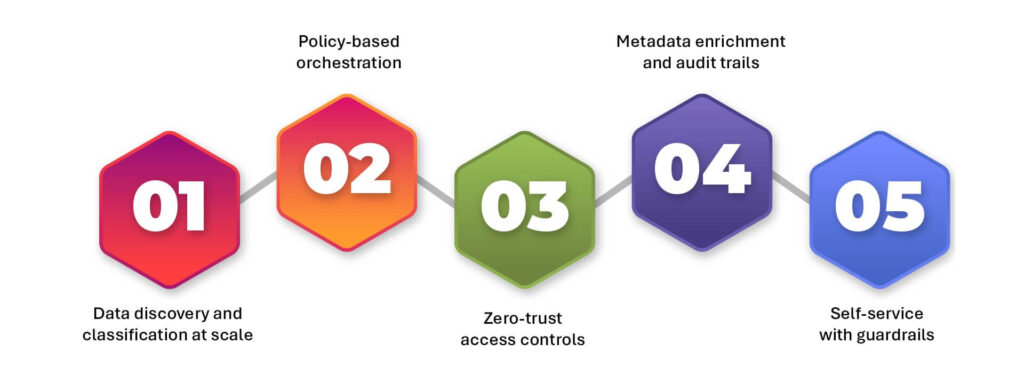
Artificial intelligence and data sovereignty: an inseparable duo
The advent of artificial intelligence, particularly generative and predictive models, has profoundly transformed the way companies use their data. These algorithms do not simply analyse a few pieces of information: they require massive volumes of constantly updated data to train, improve their accuracy and deliver reliable results. AI thus becomes a driver of performance, but also a critical consumer of data.
However, when this information is stored or processed in external environments, the risks increase significantly. Sensitive data can feed into third-party models without control, introducing bias or vulnerabilities without the company’s knowledge. In addition, the dispersion of information can lead to regulatory violations, exposing organisations to financial penalties and reputational risk.
In 2025, data sovereignty will be closely linked to AI sovereignty. Only companies capable of developing AI models based on their own internal data, hosted on secure and sovereign infrastructures, can guarantee performance, compliance and security. Without this control, they risk becoming dependent on external solutions, which may, in the future, become direct competitors or strategic leverage.
Thus, AI can no longer be considered independently of data governance. It requires a tailor-made architecture, where the back office adapts to the company’s internal infrastructure, unlike traditional rigid ERPs. This approach ensures that each algorithm is based on reliable and protected information, while complying with regulatory requirements and cybersecurity standards.
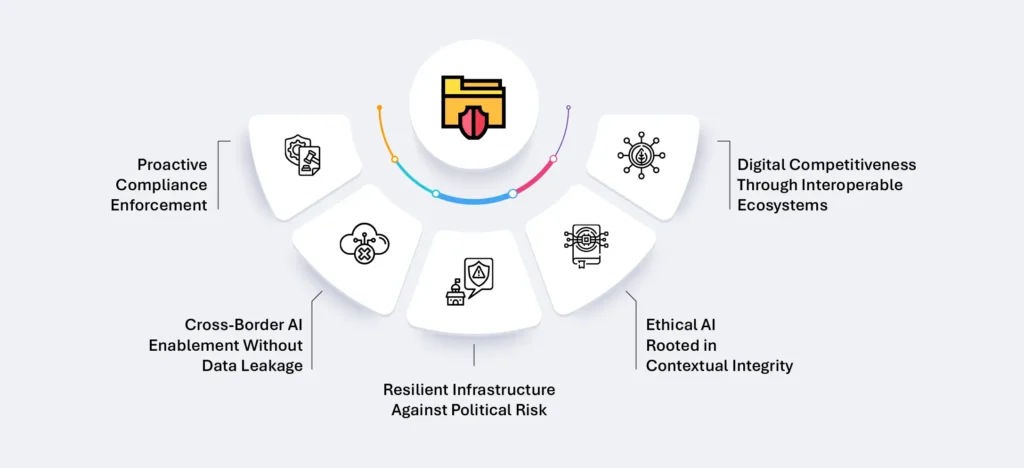
Sovereignty as an economic and competitive lever
Data sovereignty now goes beyond the simple regulatory framework: it constitutes a tangible competitive advantage. Companies that invest in sovereign solutions not only strengthen their security, but also their commercial and strategic attractiveness. The market for data governance, residency and compliance tools is estimated at $72 billion in 2025 and could reach $228 billion by 2030, reflecting the growing economic value of digital sovereignty.
Organisations that adopt sovereign infrastructures, combined with AI systems integrated into their own databases, can differentiate themselves in several ways. They improve their resilience to cyberattacks and geopolitical crises, ensure regulatory compliance in a fragmented global environment, and create reliable and responsible AI models.
In addition, consumers and partners are increasingly sensitive to data protection and transparency. Several studies show that companies are willing to pay up to 30% more for solutions that offer local and secure control of information. This ability to secure and leverage data is therefore becoming a lever for trust and competitiveness, transforming digital sovereignty into a concrete commercial asset.
Ultimately, data sovereignty is not just a technical or legal issue: it is a strategic foundation on which the enterprise of the future will be built. It enables innovation, security and performance to be reconciled while strengthening the legitimacy and credibility of organisations in the eyes of their customers, investors and partners.
To sum up
In 2025, data sovereignty is no longer just a technical issue reserved for IT experts. It has become a global governance issue, affecting strategy, competitiveness and even the legitimacy of companies.
Regaining control of your data means:
- Ensuring regulatory compliance in a fragmented world.
- Strengthening your resilience to cyberattacks and geopolitical crises.
- Creating sustainable value by building sovereign and reliable AI models.
- Strengthening the trust of customers, investors and partners.
At ARZE, we share this belief: sovereignty must remain in the hands of businesses. That’s why we never store our customers’ databases. Our technology allows us to connect our solutions directly to existing databases or to create new customized databases, while respecting existing IT environments.
Our back office and Business Intelligence tools only communicate with these databases, without recording or duplicating anything elsewhere. Exchanges are carried out exclusively via recognized secure protocols, guaranteeing data confidentiality and integrity.
Unlike traditional ERPs, which impose their own structure, our system works differently: AI is built on the company’s architecture, not the other way around. The back office adapts to the specificities of each organisation, enabling smooth, respectful and completely sovereign integration.
In other words, we put AI and the power of automation at the service of businesses, without ever compromising their autonomy or sovereignty.
Data sovereignty is therefore not a constraint, but an opportunity: the opportunity to build stronger, more resilient organisations that are better equipped to take advantage of tomorrow’s innovations.
Let’s build the future of Web3 — sovereign, accessible and sustainable.
Did you miss our last article on our integration into OVHcloud Fast Forward Blockchain & Web3 Accelerator? click here
For more information and to keep up to date:
Book a demo via our website: https://arzetechnologies.com
Follow us on X ( Twitter): X official ArzeApp
Follow us on linkedin: Linkedin arzetechnologies
Send us an email at: contact@arzetechnologies.com
Read more about hashgraph: https://www.hashgraph.com/

